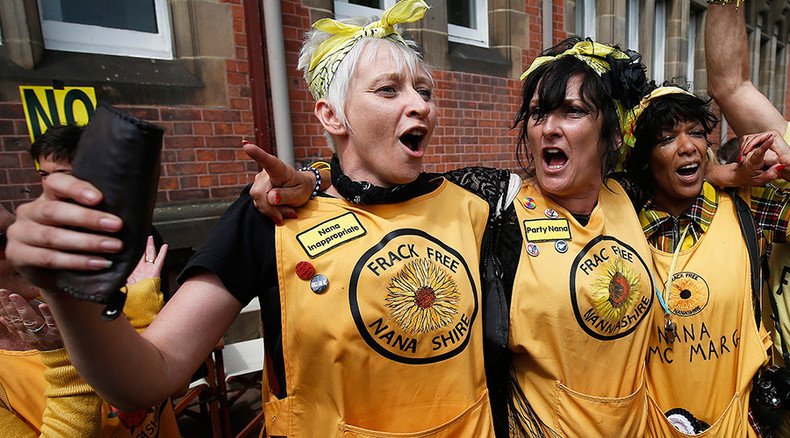Women oppose fracking because they ‘don’t understand’ – scientist

Women are more likely to oppose drilling for shale gas because they “don’t understand” and will follow their emotional instincts, a top scientist has claimed.
Chairwoman of UK Onshore Oil and Gas Averil Macdonald told the Times that a lack of scientific understanding often means women, who generally express a deep interest in the sustainability of fracking, will oppose the measures.
“Not only do [women] show more of a concern about fracking, they also know that they don’t know and they don’t understand,” Macdonald said, adding that their concerns were “entirely reasonable.”
“They are concerned because they don’t want to be taking [something] on trust. And that’s actually entirely reasonable.
“Frequently the women haven’t had very much in the way of a science education because they may well have dropped science at 16. That is just a fact.”
Macdonald is taking the helm of a campaign designed to educate women about the fracking process and the potential benefits it could bring to the UK economy.
One recent survey by the University of Nottingham found that overall men are more likely to be in favor of fracking, with 58 percent expressing support for shale gas exploration, as opposed to just 31.5 percent of women.
Men are also more likely to identify shale gas as the fossil fuel which is produced during the fracking process. Some 85 percent of men could name shale gas as the fuel, whereas only 65 percent of women knew the answer.
Fracking could lead to ‘more earthquakes in Britain’ – expert http://t.co/JFU0UJ4KA5pic.twitter.com/pl3qnnT01x
— RT UK (@RTUKnews) September 9, 2015Macdonald argued that women used their "gut" instinct rather than facts to ferment their opinions on fracking.
“Why are men persuaded? That’s because an awful lot of facts have been put forward,” she said.
“[Men] will say, ‘fair enough, understand’. But women, for whatever reason, have not been persuaded by the facts. More facts are not going to make any difference.
“What we have got to do is understand the gut reaction, the feel. The dialogue is more important than the dissemination of facts.”
The professor said the instinctive decisions made by women were often to protect their children from the unknown effects of fracking.
“I would similarly be concerned but I read the literature and I feel comfortable that I understand,” she added.
“What I hope is that I can make the women who are concerned comfortable that the myths they are worried about are myths.”
Macdonald’s comments come as the fracking industry is dealt another blow by senior lawyers, who have given campaigners the green light to bring forward a judicial review against Lancashire County Council’s decision to allow seismic monitoring systems at local explorative drilling sites.
The machines were due to be set up at the Roseacre site in Lancashire.
The council have already denied fracking company Cuadrilla’s application to drill for shale gas in the area due to concerns over the impact on local traffic.
Chairwoman of the Roseacre Awareness Group Elizabeth Warner said the High Court ruling was an important “milestone” in the UK’s exploration of shale gas, which has been based on “dubious assertions.”












